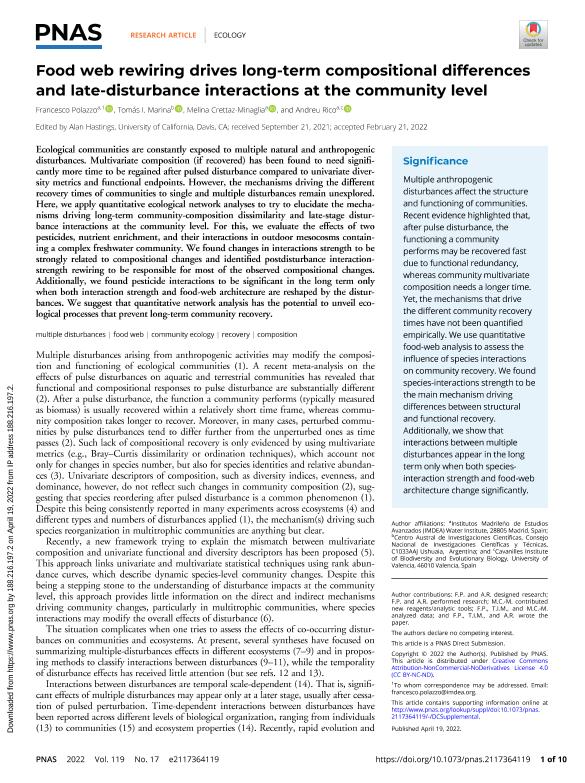Artículo
Food web rewiring drives long-term compositional differences and late-disturbance interactions at the community level
Fecha de publicación:
04/2022
Editorial:
National Academy of Sciences
Revista:
Proceedings of the National Academy of Sciences of The United States of America
ISSN:
0027-8424
Idioma:
Inglés
Tipo de recurso:
Artículo publicado
Clasificación temática:
Resumen
Ecological communities are constantly exposed to multiple natural and anthropogenic disturbances. Multivariate composition (if recovered) has been found to need significantly more time to be regained after pulsed disturbance compared to univariate diversity metrics and functional endpoints. However, the mechanisms driving the different recovery times of communities to single and multiple disturbances remain unexplored. Here, we apply quantitative ecological network analyses to try to elucidate the mechanisms driving long-term community-composition dissimilarity and late-stage disturbance interactions at the community level. For this, we evaluate the effects of two pesticides, nutrient enrichment, and their interactions in outdoor mesocosms containing a complex freshwater community. We found changes in interactions strength to be strongly related to compositional changes and identified postdisturbance interactionstrength rewiring to be responsible for most of the observed compositional changes. Additionally, we found pesticide interactions to be significant in the long term only when both interaction strength and food-web architecture are reshaped by the disturbances. We suggest that quantitative network analysis has the potential to unveil ecological processes that prevent long-term community recovery.
Palabras clave:
COMMUNITY ECOLOGY
,
COMPOSITION
,
FOOD WEB
,
MULTIPLE DISTURBANCES
,
RECOVERY
Archivos asociados
Licencia
Identificadores
Colecciones
Articulos(CADIC)
Articulos de CENTRO AUSTRAL DE INVESTIGACIONES CIENTIFICAS
Articulos de CENTRO AUSTRAL DE INVESTIGACIONES CIENTIFICAS
Citación
Polazzo, Francesco; Marina, Tomas Ignacio; Crettaz Minaglia, Melina Celeste; Rico, Andreu; Food web rewiring drives long-term compositional differences and late-disturbance interactions at the community level; National Academy of Sciences; Proceedings of the National Academy of Sciences of The United States of America; 119; 17; 4-2022
Compartir
Altmétricas




